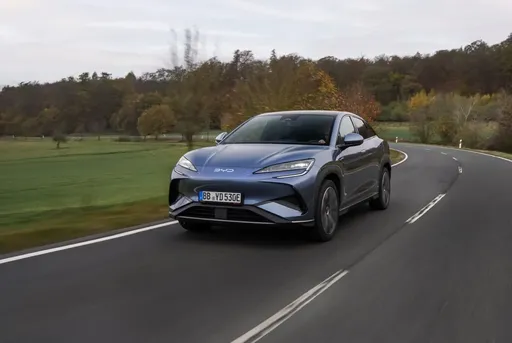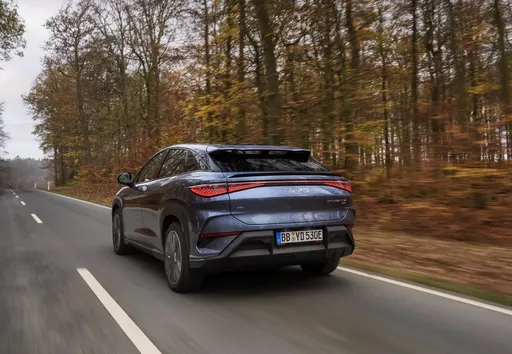Mercedes Sprinter Bus VS BYD Sealion 7 – Specs, Efficiency & Price Comparison
Which model is the better choice – the Mercedes Sprinter Bus or the BYD Sealion 7? We compare performance (190 HP vs 530 HP), boot capacity ( vs 520 L), efficiency (9.30 L vs 19.90 kWh), and of course, the price (52800 £ vs 41100 £).
Find out now which car fits your needs better!
The Mercedes Sprinter Bus (Bus) is powered by a Diesel engine and comes with a Manuel or Automatic transmission. In comparison, the BYD Sealion 7 (SUV) features a Electric engine and a Automatic gearbox.
When it comes to boot capacity, the Mercedes Sprinter Bus offers , while the BYD Sealion 7 provides 520 L – depending on what matters most to you. If you’re looking for more power, you’ll need to decide whether the 190 HP of the Mercedes Sprinter Bus or the 530 HP of the BYD Sealion 7 suits your needs better.
There are also differences in efficiency: 9.30 L vs 19.90 kWh. In terms of price, the Mercedes Sprinter Bus starts at 52800 £, while the BYD Sealion 7 is available from 41100 £.
Compare all the key specs now and find out which model fits your lifestyle best!
Mercedes Sprinter Bus
The Mercedes-Benz Sprinter Bus stands out as a versatile option for those seeking both comfort and practicality in a people mover. Its spacious interior design ensures ample room for passengers while maintaining a smooth and efficient driving experience. With its advanced safety features and modern amenities, the Sprinter Bus continues to be a leader in its class.
detailsBYD Sealion 7
The Sealion 7 captivates with its striking design and impressive performance that appeals to both enthusiasts and casual drivers alike. With a focus on comfort and advanced technology, this model redefines the driving experience, making every journey enjoyable. Its sleek silhouette coupled with an innovative interior showcases the perfect blend of style and functionality.
details @ BYD
@ BYD
 @ BYD
@ BYD
 @ BYD
@ BYD

|
|
|
|
|
Costs and Consumption |
|
|---|---|
|
Price
52800 - 82500 £
|
Price
41100 - 50600 £
|
|
Consumption L/100km
9.3 - 12.3 L
|
Consumption L/100km
-
|
|
Consumption kWh/100km
-
|
Consumption kWh/100km
19.9 - 21.9 kWh
|
|
Electric Range
-
|
Electric Range
456 - 502 km
|
|
Battery Capacity
-
|
Battery Capacity
-
|
|
co2
244 - 322 g/km
|
co2
0 g/km
|
|
Fuel tank capacity
71 L
|
Fuel tank capacity
-
|
Dimensions and Body |
|
|---|---|
|
Body Type
Bus
|
Body Type
SUV
|
|
Seats
2
|
Seats
5
|
|
Doors
4
|
Doors
4
|
|
Curb weight
2251 - 2559 kg
|
Curb weight
2225 - 2435 kg
|
|
Trunk capacity
-
|
Trunk capacity
520 L
|
|
Length
5932 - 6967 mm
|
Length
4830 mm
|
|
Width
1993 mm
|
Width
1925 mm
|
|
Height
2435 - 2659 mm
|
Height
1620 mm
|
|
Payload
814 - 1249 kg
|
Payload
410 kg
|
Engine and Performance |
|
|---|---|
|
Engine Type
Diesel
|
Engine Type
Electric
|
|
Transmission
Manuel, Automatic
|
Transmission
Automatic
|
|
Transmission Detail
Manual Gearbox, Automatic Gearbox
|
Transmission Detail
Reduction Gearbox
|
|
Drive Type
Rear-Wheel Drive, All-Wheel Drive
|
Drive Type
Rear-Wheel Drive, All-Wheel Drive
|
|
Power HP
114 - 190 HP
|
Power HP
313 - 530 HP
|
|
Acceleration 0-100km/h
-
|
Acceleration 0-100km/h
4.5 - 6.7 s
|
|
Max Speed
150 - 160 km/h
|
Max Speed
215 km/h
|
|
Torque
300 - 450 Nm
|
Torque
380 - 690 Nm
|
|
Number of Cylinders
4
|
Number of Cylinders
-
|
|
Power kW
84 - 140 kW
|
Power kW
230 - 390 kW
|
|
Engine capacity
1950 cm3
|
Engine capacity
-
|
General |
|
|---|---|
|
Model Year
2024
|
Model Year
2024
|
|
CO2 Efficiency Class
G
|
CO2 Efficiency Class
A
|
|
Brand
Mercedes-Benz
|
Brand
BYD
|
Mercedes Sprinter Bus
The Mercedes-Benz Sprinter Bus: A Revolution in Transport
The Mercedes-Benz Sprinter Bus has long been a symbol of efficiency and reliability. Renowned for its versatility and performance, Mercedes-Benz continues to push boundaries with its latest models, catering to the needs of businesses and individuals alike. Whether used for passenger transport or as a corporate shuttle, the Sprinter Bus offers an exceptional driving experience, combining innovative technology with superior comfort.
Engineering Excellence: Under the Bonnet
At the heart of the Mercedes-Benz Sprinter Bus is its robust engine lineup, offering power outputs ranging from 114 PS to an impressive 190 PS. These variants ensure that there is a model suitable for every requirement, whether you need efficient city commuting or robust highway cruising.
The Sprinter Bus is equipped with either a manual or automatic transmission, providing flexibility to suit different driving preferences. The sophisticated 9G-TRONIC automatic gearbox represents a pinnacle of automotive engineering, ensuring smooth and efficient gear changes, which enhance the overall driving experience.
Performance and Efficiency: Meeting Environmental Standards
The Sprinter Bus's diesel engines are not just about power; they also focus on fuel efficiency, with consumption figures between 9.3 L/100km and 12.3 L/100km. The inclusion of start/stop technology helps in reducing fuel consumption, thus making it more economical and environmentally friendly.
Mercedes-Benz shows its commitment to sustainability by ensuring all engine options comply with stringent emissions standards. The models provide a CO2 efficiency class of G, underlining the brand's dedication to creating vehicles that are as kind to the planet as they are to your pocket.
Design and Comfort: Where Function Meets Style
The design of the Mercedes-Benz Sprinter Bus effortlessly combines functionality with aesthetics. The interior space is crafted to provide maximum comfort for passengers, while the exterior design leaves a lasting impression with its sleek lines and authoritative presence.
The Sprinter Bus can accommodate up to nine seats, making it ideal for passenger transport. Options such as air conditioning, advanced infotainment systems, and ergonomic seating ensure a pleasant experience for both driver and passengers, even on long journeys.
Safety and Technology: Prioritising Your Well-being
The Sprinter Bus offers a suite of advanced safety features aimed at keeping occupants safe, including adaptive cruise control, lane keep assist, and crosswind assist. These features are integrated with cutting-edge technology, such as the Mercedes-Benz User Experience (MBUX) system, which enhances connectivity and user interaction.
With rear-wheel drive and optional all-wheel drive capabilities, the Sprinter Bus is equipped to handle a variety of terrains and weather conditions, providing reassurance for every journey.
The Future of Transport: Innovative Options
Mercedes-Benz demonstrates their innovative edge with customisation options tailored to various business needs, be it for luxury transport or robust utility. Additionally, the Sprinter Bus's load capacity ranges from 814 kg to 1,249 kg, ensuring businesses can meet their logistical needs efficiently.
As demands for sustainable transport solutions grow, the Sprinter Bus is positioned as a forward-looking vehicle that blends traditional Mercedes-Benz quality with modern innovations.
The Mercedes-Benz Sprinter Bus is more than just a vehicle; it is an investment in exceptional performance and unmatched adaptability, engineered to meet the diverse demands of today's transport sector. From its powerful yet efficient engines to its state-of-the-art technology and safety features, the Sprinter remains a leader in its class.
BYD Sealion 7
The automotive landscape is evolving faster than ever, and one model capturing significant attention is the BYD Sealion 7. This electric SUV not only marries performance with sustainability but also boasts innovations that redefine user expectations. Let’s dive into the technical aspects and standout innovations of this remarkable vehicle.
Powerful Performance and Versatile Configurations
The BYD Sealion 7 comes in several configurations, catering to diverse performance needs. It offers two versions of electric all-wheel drive, producing an impressive 530 horsepower, while the rear-wheel drive variant delivers a solid 313 horsepower. This spectrum of power allows drivers to select an option that aligns with their driving style and requirements.
Acceleration is another noteworthy aspect of the Sealion 7. The rear-wheel drive model achieves 0-100 km/h in just 6.7 seconds, while the all-wheel drive variant does it in a breathtaking 4.5 seconds. This combination ensures that the Sealion 7 doesn’t just compete; it leads in performance within its segment.
Innovative Electric Drive and Efficiency
Equipped with a cutting-edge reduction gearbox, the BYD Sealion 7 not only delivers incredible acceleration but also underscores efficiency with a consumption rate as low as 19.9 kWh per 100 km for the most efficient model. The all-wheel drive variants have slightly higher consumption rates of 21.4 kWh and 21.9 kWh, respectively, but they still perform admirably when it comes to efficiency.
In terms of electric range, the Sealion 7 showcases a commendable performance. Depending on the specific configuration, it offers ranges between 456 and 502 km on a single charge, making it a competitive choice for those concerned about range anxiety typical of electric vehicles.
Sleek Design and Practicality
Beyond performance and efficiency, the BYD Sealion 7 impresses with its aesthetic appeal and practicality. With dimensions of 4830 mm in length, 1925 mm in width, and 1620 mm in height, this SUV is designed for presence. Moreover, the spacious interior comfortably accommodates up to five passengers, enhancing its usability for families and adventure seekers alike.
Practical features like a trunk capacity of 520 liters ensure that the Sealion 7 stands ready for any journey, whether it’s a weekend road trip or daily commuting. Additionally, the vehicle has a payload capacity of up to 410 kg, providing flexibility for carrying cargo without sacrificing comfort.
Safety and Eco-Friendliness
The BYD Sealion 7 also excels in safety and sustainability. It holds a CO2 efficiency class of A, making it an environmentally friendly option with zero emissions during operation. This aligns with the growing consumer demand for greener transportation solutions.
Furthermore, the vehicle is engineered with multiple safety features that ensure a secure driving experience for all occupants, a crucial element that underscores the ongoing commitment by BYD to safety in electric vehicles.
Final Thoughts
As an emblem of electrification in the automotive industry, the BYD Sealion 7 stands out with its combination of powerful performance, innovative technology, and eco-friendly credentials. For those exploring the electric SUV market, this vehicle represents a significant milestone, offering a compelling argument for drivers looking to transition to a more sustainable yet thrilling driving experience.
The prices and data displayed are estimates based on German list prices and may vary by country. This information is not legally binding.
